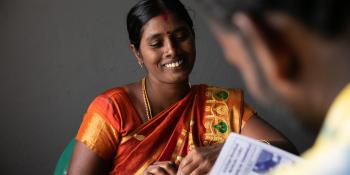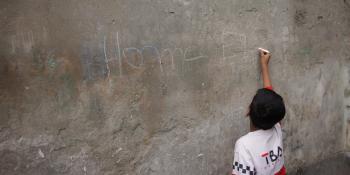
Challenges
Household incomes for daily wage workers are typically around 3,500 India rupees, or US$40, per month. Many homes are connected to the electricity grid, but the supply is expensive and erratic. Most areas have power cuts for 6-8 hours per day.
Every rupee spent on candles and kerosene burners means less money for food, medicines and other necessities. They also increase risks of fires and health problems.
Cooking and studying are difficult after dark. People often feel unsafe, uncomfortable and insecure. Rodents and snakes can enter unlit houses.
Affordable, clean, reliable power and lighting is needed.
Solution
“Saur Oorja” means “solar power” in Hindi. We will support households to install and maintain off-grid rooftop solar systems.
Our approach:
- The systems meet government quality standards and complement its efforts to provide uninterrupted electricity throughout India.
- Every family will have enough power for a few lightbulbs, a fan and other small appliances.
Timescale: Installation could be completed within 12 months. The start date is dependent on local factors such as the Monsoon season.
Results and benefits
We will provide solar systems for around 250 households. This would benefit over 1,000 individuals. During the installation phase, we will commission over 40 systems per month on average.

Everyone in these homes will benefit from reliable, clean and safe power. They will feel more comfortable and secure.
Families will be able to cook under lightbulbs after sunset, leaving more of the daytime for other productive activities. Children will be able to do their school homework after dark.
Free power and light mean households will have more money for groceries, healthcare, school costs and other essentials.
We will demonstrate the technology and its benefits to local government officials. This will enable us to advocate for solar systems to be adopted more widely across the states.
Long-term impact
Solar power can be life-changing. The money saved can be invested in education and livelihoods. This drives development and progress.

Pupils who can study at home perform better at school.
Attendance improves.
Children that do well are likely to continue their education and gain higher qualifications.
This benefits themselves, their families and their communities.
Fewer kerosene lamps means less indoor air pollution. This reduces chest infections, eye irritations and other health issues.
The shift to renewable energy reduces carbon dioxide emissions and makes a positive contribution to climate action.
Success will empower Habitat for Humanity to influence government departments and leaders in the construction industry to install even more solar power systems.
Scale-up
With more co-funding, this project could provide solar power for hundreds — or thousands — more families across multiple locations. Please get in touch to request a tailored proposal if a higher level of investment is possible.
Get involved
The co-funding organization will have many opportunities to participate. For example, staff could volunteer to help with installation or join the opening ceremony with local government officials.

